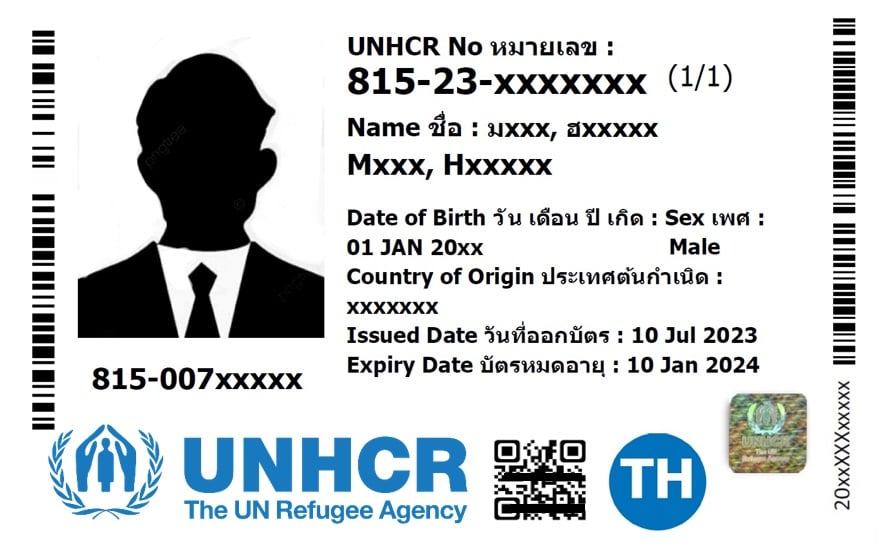ATTENTION! Your refugee status or card does not give you legal status in Thailand or replace a valid passport and visa. If your visa has expired or you entered Thailand illegally, Thai authorities still consider you an “illegal alien.”
The following information is meant for people who are registered with Thailand UNHCR and have a valid UNHCR card:

Unfortunately, any refugee and asylum seeker without a valid visa is at risk of arrest on immigration charges. If you have already been charged with an immigration violation, you will be brought to the Immigration Detention Center (IDC).
Please note that the UNHCR hotline is now limited to urgent deportation-related incidents only.
- If an arrest or detention occurs, you or someone you know may report the incident to UNHCR by completing the online reporting form: Detention/Arrest Incident Submission / การรายงานเหตุการณ์การถูกควบคุมตัว
What should I do if I am stopped by authorities or arrested? ⬇️
In Thailand, “illegal aliens”, individuals without a passport and/or a valid visa, may be arrested, detained, and deported.
- You are also at risk of arrest if you work without a work permit.
If Thai authorities approach you, show your original UNHCR card, explain your situation in Thailand and request POLITELY that they not arrest you. Please note, however, that the UNHCR card does not guarantee that you will not be arrested.
If you are unable to submit the UNHCR arrest reporting form online, please ask a family member or friend to assist you. You may also contact other organizations for support, such as your legal representative.
What should I do if I am brought to the Immigration Detention Center (IDC)? ⬇️
If you are arrested and charged with an immigration offence, you will:
- Be brought before a judge, and then
- Transferred to the Immigration Detention Center (IDC).
UNHCR officers are at Suan Phlu and Bang Khen IDCs in Bangkok several days a week and can usually access other IDCs outside Bangkok if needed.
Once UNHCR knows about your detention at IDC, we will alert the IDC authorities that you are seeking international protection, are registered with UNHCR, and should not be deported. This also allows UNHCR officers to meet with you for interviews or counselling.
Can I receive medical treatment in Immigration Detention Center (IDC)? ⬇️
The Royal Thai Government should provide you with medical assistance in the immigration detention centre. If you need medical attention while you are detained, let the IDC authorities or the healthcare worker know of your condition.
Basic healthcare services should be provided within the IDC facility. In the case of a serious medical condition or medical emergency, IDC may decide to refer you to a hospital. For other medical needs outside of the IDC, referral to a hospital must be approved by IDC healthcare staff, and you must be able to cover the cost of the hospital treatment.
UNHCR does not provide medical assistance in IDC.
How can I be released on bail? ⬇️
According to current immigration policy (as of January 2023), most refugees and asylum seekers can apply to be released from detention upon bail.
To apply for bail:
- Bail application is made to the IDC authorities, and there are generally two requirements:
- Pay the bail amount (to be confirmed by the authorities, but usually 50,000 THB).
- Have a Thai citizen guarantor. (Guarantor can also be non-Thai with legal residence, though if they don’t speak Thai, it may be very difficult for them to successfully coordinate with the IDC bail unit.)
- The bail application requires additional information about where you will live after being released.
- After the bail application is submitted, IDC will ask UNHCR confirm your status with UNHCR.
- If the bail application is approved, you will be released from IDC and given documentation to show that you are released on bail. If you are stopped again by any authorities, it is important to show these documents.
- Persons who are released on bail will usually be required to report to the IDC every month along with their guarantor. If you do not report on the scheduled date, your bail may be revoked, meaning that you will be detained and the bail money taken.
- If you leave the country legally, the guarantor can apply to have the bail money refunded. This process usually takes a few months.
Can UNHCR help me with bail? ⬇️
UNHCR officers are available to counsel detained asylum-seekers and refugees, their family members and any other authorized third parties on the current bail policies and procedures. However, UNHCR does not pay for bail and cannot act as a guarantor.
UNHCR consistently advocates with Royal Thai Government to release asylum-seekers and refugees from the Immigration Detention Center. UNHCR has no authority, however, regarding bail policies or eligibility for bail, as these are the responsibility of the Royal Thai Government.
As a refugee or asylum-seeker, can I still be deported from Thailand and forced to return to my country of origin? ⬇️
UNHCR will intervene and advocate with authorities that no asylum-seekers or recognized refugees are forced to return to a country where they fear persecution. However, it is ultimately the Royal Thai Government’s responsibility and decision.
- If you have told IDC authorities that you wish to return but no longer intend to do so, please inform the IDC authorities of your change of mind immediately. You can also inform UNHCR to help communicate this change to the IDC authorities.
- In the unlikely case that authorities inform you that you are scheduled for deportation to your country, and you do not wish to return, it is important that you clearly tell IDC authorities that you do not want to be returned and contact UNHCR as soon as possible. If you cannot contact UNHCR, please ask someone to contact UNHCR on your behalf urgently so that UNHCR can intervene, if necessary.
